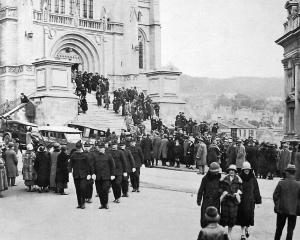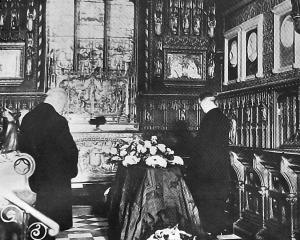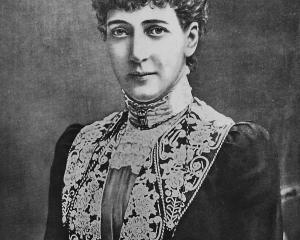The Quaker must either make the Parliament of New Zealand his God or endure their pains and penalties if he hold by his conviction, now 600 years old, that armed resistance to evil is against the Divine will.
I do not agree with the Quaker conscience, but to see it coerced with bludgeons, and to see a minister whose ancestors had queer consciences and suffered for them, to the world's great good, applauding the bludgeoning, is more than I care for.
I agree, with regrets, to conscription under the present circumstances.
But we are not in such straits that we must surrender the results of the progress so painfully achieved in the past and coerce the religious conscience in order to uphold the State.
The Quakers have reiterated officially, and within the last few months, their adhesion to their old position.
No private information can gainsay that public fact.
We shall yet see, unless the Upper House saves us from the sight, some of the gentlest and purest Christians in our land, working in our quarries with thieves and blackguards, because in conscience they cannot consent, at the bidding of the modern State, to do what they believe is against the mind of Christ.
Those who disagree with their conclusions, as I do, should at least honour their well-proven sincerity. - I am, etc., J. J. North.
• A disease rare to North Otago, and happily of infrequent occurrence elsewhere in the dominion, has made its appearance amongst three North Otago herds, namely actinomycosis, commonly known as "lumpy-jaw'' (reports the Oamaru Mail).
There are 15 cases in these herds, bulls and cows being the animals affected, and both have for some time been under the observation of Mr F. W. Blair, the local stock inspector.
On Friday afternoon the veterinary officers from Dunedin, Gore, Invercargill and Amberley made a visit to the farms.
The affliction is a fungus which attacks firstly the bone of the jaw, causing the excrescences which give it the name of lumpy-jaw.
If not checked, the disease spreads into other parts of the body, being noticeable in the lungs in the form of yellow spots.
Cases have been known, comparatively rare, where the sickness has made its appearance simultaneously throughout the herd in all parts of the body.
The affected beasts are being treated with the prescribed medicine, but as this is very expensive, another course would probably be followed in killing the animals, were they not valuable.
This would appear to be a case where the Agricultural Department might with advantage undertake the cure of the beasts free of expense to the owner.
• A large quantity of coal is being trucked from the Kaitangata mines.
On Thursday last, it took the local train one hour to go the four miles to Stirling with the largest tonnage (370 tons) yet known with one engine.
On Friday the tonnage was nearly the same, and the train managed with difficulty to connect with the evening's express.
• According to the Kaitangata correspondent of the Clutha Leader a sand-bar is gradually working its way across the mouth of the Clutha River.
An island of sand has shown itself where deep water was met with for many years past, and it is questionable whether an ordinary small row-boat could have found sufficient depth of water to cross the bar on Sunday evening. - ODT, 20.6.1916.
• COPIES OF PICTURE AVAILABLE FROM ODT FRONT OFFICE, LOWER STUART ST, OR WWW.OTAGOIMAGES.CO.NZ












